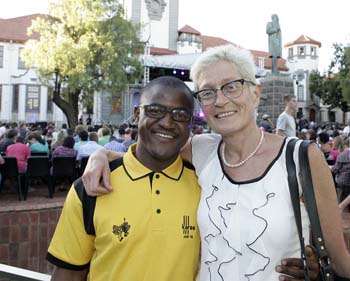First university student from Elzabé Zietsman’s Doilie Foundation chooses Kovsies

Naledi Dweba and Elzabé Zietsman
Photo: Johan Roux |
Naledi Dweba, one of the young people mentored by the well-known singer, Elzabé Zietsman, will become a Kovsie this year.
Although the University of the Free State (UFS) wasn’t the only university to offer Dweba a scholarship, he decided on Kovsies without doubt or further consideration and enrolled for his BMus degree with us. His instrument is the clarinet and Dweba reckons the outstanding Danré Strydom – a lecturer at the UFS’s Odeion School of Music – is the reason why he decided on Kovsies.
“She is a remarkable music teacher,” says Dweba.
Dweba, who only started with music lessons at the age of 15, recently performed his Grade 8 exam. Last year he also obtained a music distinction in matric.
Dweba and Zietsman met four years ago and, as a result of her Doilie Foundation, he now has the opportunity to pursue his dreams as a music student. Zietsman started the foundation in 2012 in order to help talented children.
“I have so many talented young people under my care, but Naledi is the first one to attend university,” Zietsman said at the university’s 2015 first-year’s welcoming on the Bloemfontein Campus.
The Doilie Foundation currently provides for several artistic children – from musicians to ballerinas.